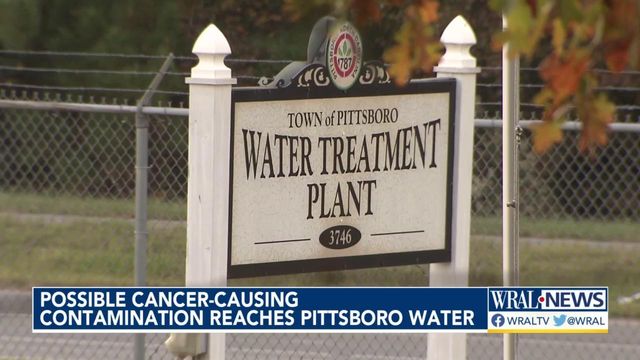Pittsboro 'confident water is safe' after most recent release of contaminant upstream
Town leaders were alerted on Monday afternoon that the City of Greensboro - upriver from Pittsboro on the Haw - had exceeded an agreement for the amount of a possible carcinogen allowed in the Haw River.
Posted — UpdatedTown leaders were alerted on Monday afternoon that the City of Greensboro – upriver from Pittsboro on the Haw – had exceeded an agreement for the amount of 1,4 dioxane allowed in the Haw River.
Any contamination moves along the river as a "slug," or a concentrated segment of water.
Pittsboro has seen multiple "slugs" that contained 1,4 dioxane since the summer. Each time, Kennedy said, they've been able to detect and purge the contaminant from the water before it became a threat to local customers.
Under normal circumstances, the town pumps water from the Haw River to the local treatment plant and then out into the community. When alerted to the possible contamination, Pittsboro staff reacted by shutting down the town's draw from the Haw, "to allow potentially contaminated water to flow downstream," Town Manager Chris Kennedy said in a statement.
Follow-up tests on Monday and Tuesday showed 1,4 dioxane levels in the Pittsboro water treatment plant and other tanks around town within acceptable levels.
"It appears the town has 'dodged the bullet' with this release event," Kennedy wrote. The additional 1,4 dioxane "passed by the town's raw water intake without incident."
The town has not asked residents to use bottled water for drinking or cooking. Kennedy says there is plenty in reserve – in elevated tanks – to provide for all water customers for several days.
That is small comfort to Pittsboro resident Elisabeth Delafield, whose family uses town water to drink, cook and bathe.
"If you have a 1-year-old and a 3-year-old, they ingest bath water. It's impossible to prevent them from doing that," she said.
Elija Williams, who oversees the T.Z. Osbourne Wastewater Plant near Greensboro, said he called impacted communities as soon as he knew contaminated water was headed their way.
"I called all of the other utilities downstream to us, that goes all the way down to Wilmington,” said Williams.
The problem was that a regular water sample was tested last Wednesday, but the results didn't come back until five days later, on Monday.
"It's deeply disappointing that our partners in the City of Greensboro were not able to give us proper timely warning of this discharge," said Pittsboro Commissioner John Bonitz.
Pittsboro leaders want more – from Greensboro and from the state – in terms of limiting and mitigating water contamination. In May, the two communities agreed to a consent order which Kennedy says has been violated multiple times.
Katie Bryant, co-founder of Clean Haw River, says it's not just 1,4 dioxane. For years, so-called forever chemicals from upstream have plagued the river.
"It's a continual contamination issue," she said.
Williams said Greensboro still hasn't identified which of its thousands of customers emitted the 1,4 dioxane into its system.
"We are very concerned about the excursions that we've had. We are working very hard to find the sources," he said.
Meanwhile, Kennedy says, the water in Pittsboro is safe. "We remain confident that our water is safe for consumption and use in both residential and commercial applications."
The town plans to continue daily testing and limiting the amount of water it draws from the Haw until they can be certain the danger has passed.
Related Topics
• Credits
Copyright 2024 by Capitol Broadcasting Company. All rights reserved. This material may not be published, broadcast, rewritten or redistributed.






